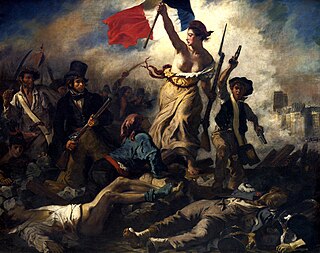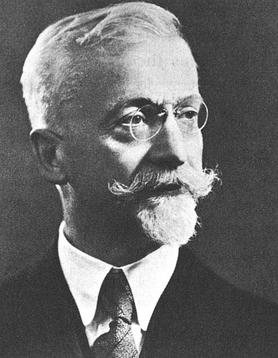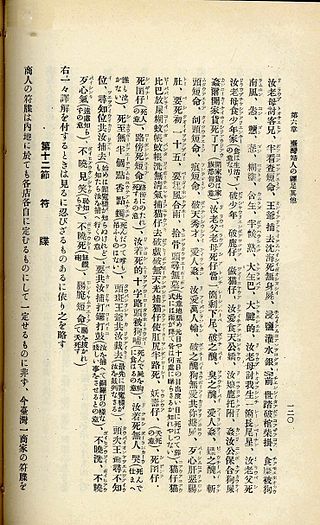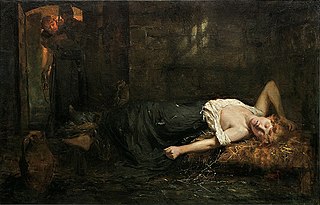
An epitaph is a short text honoring a deceased person. Strictly speaking, it refers to text that is inscribed on a tombstone or plaque, but it may also be used in a figurative sense. Some epitaphs are specified by the person themselves before their death, while others are chosen by those responsible for the burial. An epitaph may be written in prose or in poem verse.

A homeland is a place where a cultural, national, or racial identity has formed. The definition can also mean simply one's country of birth. When used as a proper noun, the Homeland, as well as its equivalents in other languages, often has ethnic nationalist connotations. A homeland may also be referred to as a fatherland, a motherland, or a mother country, depending on the culture and language of the nationality in question.

A regular expression is a sequence of characters that specifies a search pattern in text. Usually such patterns are used by string-searching algorithms for "find" or "find and replace" operations on strings, or for input validation. Regular expression techniques are developed in theoretical computer science and formal language theory.

A gift or a present is an item given to someone without the expectation of payment or anything in return. An item is not a gift if that item is already owned by the one to whom it is given. Although gift-giving might involve an expectation of reciprocity, a gift is meant to be free. In many countries, the act of mutually exchanging money, goods, etc. may sustain social relations and contribute to social cohesion. Economists have elaborated the economics of gift-giving into the notion of a gift economy. By extension the term gift can refer to any item or act of service that makes the other happier or less sad, especially as a favor, including forgiveness and kindness. Gifts are also first and foremost presented on occasions such as birthdays and holidays.

Élie Joseph Cartan was an influential French mathematician who did fundamental work in the theory of Lie groups, differential systems, and differential geometry. He also made significant contributions to general relativity and indirectly to quantum mechanics. He is widely regarded as one of the greatest mathematicians of the twentieth century.

Paul Ekman is an American psychologist and professor emeritus at the University of California, San Francisco who is a pioneer in the study of emotions and their relation to facial expressions. He was ranked 59th out of the 100 most cited psychologists of the twentieth century. Ekman conducted seminal research on the specific biological correlations of specific emotions, attempting to demonstrate the universality and discreteness of emotions in a Darwinian approach.
A microexpression is a facial expression that only lasts for a short moment. It is the innate result of a voluntary and an involuntary emotional response occurring simultaneously and conflicting with one another, and occurs when the amygdala responds appropriately to the stimuli that the individual experiences and the individual wishes to conceal this specific emotion. This results in the individual very briefly displaying their true emotions followed by a false emotional reaction.
In mathematics, an expression or mathematical expression is a finite combination of symbols that is well-formed according to rules that depend on the context. Mathematical symbols can designate numbers (constants), variables, operations, functions, brackets, punctuation, and grouping to help determine order of operations and other aspects of logical syntax.
Local church may refer to:
A spade is a digging and gardening tool.
In United States constitutional law, a forum is a property that is open to public expression and assembly.
The Korean language has a system of honorifics that recognizes and reflects the hierarchical social status of participants with respect to the subject and/or the object and/or the audience. Speakers use honorifics to indicate their social relationship with the addressee and/or subject of the conversation, concerning their age, social status, gender, degree of intimacy, and speech act situation.

"Bob's your uncle" is a phrase commonly used in the United Kingdom and Commonwealth countries that means "and there it is", or "and there you have it", or "it's done". Typically, someone says it to conclude a set of simple instructions or when a result is reached. The meaning is similar to that of the French expression "et voilà!".

In Plato's The Republic, a noble lie is a myth or a lie knowingly propagated by an elite to maintain social harmony. Plato presented the noble lie in the fictional tale known as the myth or parable of the metals in Book III. In it, Socrates provides the origin of the three social classes who compose the republic proposed by Plato. Socrates speaks of a socially stratified society as a metaphor for the soul, wherein the populace are told "a sort of Phoenician tale":
...the earth, as being their mother, delivered them, and now, as if their land were their mother and their nurse, they ought to take thought for her and defend her against any attack and regard the other citizens as their brothers and children of the self-same earth...While all of you, in the city, are brothers, we will say in our tale, yet god, in fashioning those of you who are fitted to hold rule, mingled gold in their generation, for which reason they are the most precious—but in the helpers, silver, and iron and brass in the farmers and other craftsmen. And, as you are all akin, though, for the most part, you will breed after your kinds, it may sometimes happen that a golden father would beget a silver son, and that a golden offspring would come from a silver sire, and that the rest would, in like manner, be born of one another. So that the first and chief injunction that the god lays upon the rulers is that of nothing else are they to be such careful guardians, and so intently observant as of the intermixture of these metals in the souls of their offspring, and if sons are born to them with an infusion of brass or iron they shall by no means give way to pity in their treatment of them, but shall assign to each the status due to his nature and thrust them out among the artisans or the farmers. And again, if from these there is born a son with unexpected gold or silver in his composition they shall honor such and bid them go up higher, some to the office of guardian, some to the assistanceship, alleging that there is an oracle that the city shall then be overthrown when the man of iron or brass is its guardian.

Sarcasm is the caustic use of words, often in a humorous way, to mock someone or something. Sarcasm may employ ambivalence, although it is not necessarily ironic. Most noticeable in spoken word, sarcasm is mainly distinguished by the inflection with which it is spoken or, with an undercurrent of irony, by the extreme disproportion of the comment to the situation, and is largely context-dependent.
Papuan Malay or Irian Malay is a Malay-based creole language spoken in the Indonesian part of New Guinea. It emerged as a contact language among tribes in Indonesian New Guinea for trading and daily communication. Nowadays, it has a growing number of native speakers. More recently, the vernacular of Indonesian Papuans has been influenced by Standard Indonesian, the national standard dialect. It is mainly spoken in coastal areas of West Papua alongside 274 other languages spoken here.

Hokkien is one of the largest Chinese language groups worldwide. Profanity in Hokkien most commonly involves sexual references and scorn of the object's ancestors, especially their mother. The mentioning of sexual organs is frequently used in Hokkien profanity.

"Après moi, le déluge" is a French expression attributed to King Louis XV of France, or in the form "Après nous, le déluge" to Madame de Pompadour, his favourite. It is generally regarded as a nihilistic expression of indifference to whatever happens after one is gone, though it may also express a more literal forecasting of ruination. Its meaning is translated by Brewer in the forms "When I am dead the deluge may come for aught I care", and "Ruin, if you like, when we are dead and gone."










